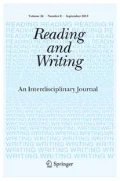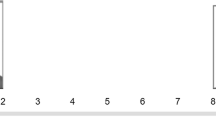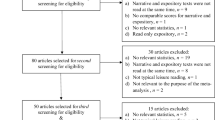Abstract
Inferential comprehension is necessary to connect ideas in a text together in a meaningful manner. There have been multiple studies on inferential comprehension involving texts of different genres (narrative and expository), but not a coherent overview of the findings of inferential comprehension by genre. The purpose of this study is to provide a coherent overview by conducting a meta-analysis of the findings of inferential comprehension by genre. A systematic review of the literature yielded 18 reports with 19 independent studies involving 1714 participants in which inferential comprehension was compared by genre. Based on robust variance estimation, scores on measures of inferential comprehension were higher for narrative texts than expository texts (g = .36, p = .02). This effect did not vary depending on whether inferential comprehension was assessed during or after reading, whether the texts for each genre were matched for readability, whether the reader was an adult or child, and whether the inference connected different ideas in the text (text connecting) or the text to background knowledge (knowledge based). Potential explanations of genre differences in inferential comprehension and future directions for research are discussed.

Similar content being viewed by others
References
Arfé, B., Mason, L., & Fajardo, I. (2018). Simplifying informational text structure for struggling readers. Reading and Writing: An Interdisciplinary Journal, 31, 2191–2210. https://doi.org/10.1007/s11145-017-9785-6.
Baker, L., & Stein, N. (1981). The development of prose comprehension skills. In C. Santa & B. Hayes (Eds.), Children’s prose comprehension: Research and practice. Newark: International Reading Association.
Beers, S. F., & Nagy, W. E. (2011). Writing development in four genres from grades three to seven: Syntactic complexity and genre differentiation. Reading and Writing: An Interdisciplinary Journal, 24, 183–202. https://doi.org/10.1007/s11145-010-9264-9.
Best, R., Ozuru, Y., Floyd, R. G., & McNamara, D. (2006). Children’s text comprehension: Effects of genre, knowledge, and text cohesion. In ICLS 2006—International conference of the learning sciences, proceedings (vol. 1, pp. 37–42).
Best, R. M., Floyd, R. G., & McNamara, D. S. (2008). Differential competencies contributing to children’s comprehension of narrative and expository texts. Reading Psychology, 29, 137–164. https://doi.org/10.1080/02702710801963951.
Bloch, M. (2014). Meta-analysis and moderator analysis: Can the field develop further? Journal of the American Academy of Child and Adolescent Psychiatry, 53, 135–137. https://doi.org/10.1016/j.jaac.2013.12.001.
Bohn-Gettler, C. M., & Kendeou, P. (2014). The interplay of reader goals, working memory, and text structure during reading. Contemporary Educational Psychology, 39, 206–219. https://doi.org/10.1016/j.cedpsych.2014.05.003.
Borenstein, M., Hedges, L. V., Higgins, J. P. T., & Rothstein, H. R. (2009). Introduction to meta-analysis. Hoboken: Wiley.
Bowyer-Crane, C. (2002). The relationship between reading comprehension and online inference generation in children. Doctoral thesis. Retrieved from http://etheses.whiterose.ac.uk/id/eprint/14165.
Bridge, C. A., & Tierney, R. J. (1981). The inferential operations of children across text with narrative and expository tendencies. Journal of Reading Behavior, 13, 201–214. https://doi.org/10.1080/10862968109547408.
Cain, K., Oakhill, J., & Bryant, P. (2004a). Children’s reading comprehension ability: Concurrent prediction by working memory, verbal ability, and component skills. Journal of Educational Psychology, 96, 31. https://doi.org/10.1037/0022-0663.96.1.31.
Cain, K., Oakhill, J., & Lemmon, K. (2004b). Individual differences in the inference of word meanings from context: The influence of reading comprehension, vocabulary knowledge, and memory capacity. Journal of Educational Psychology, 96, 671. https://doi.org/10.1037/0022-0663.96.4.671.
Cain, K., & Oakhill, J. V. (1999). Inference making ability and its relation to comprehension failure in young children. Reading and Writing: An Interdisciplinary Journal, 11(5–6), 489–503. https://doi.org/10.1023/A:1008084120205.
Carlisle, J. F. (1989). The use of the sentence verification technique in diagnostic assessment of listening and reading comprehension. Learning Disability Research, 5, 33–44.
Clinton, V., & Van den Broek, P. (2012). Interest, inferences, and learning from texts. Learning and Individual Differences, 22, 650–663. https://doi.org/10.1016/j.lindif.2012.07.004.
Collins, A. A., Compton, D. L., Lindström, E. R., & Gilbert, J. K. (2019). Performance variations across reading comprehension assessments: Examining the unique contributions of text, activity, and reader. Reading and Writing: An Interdisciplinary Journal. https://doi.org/10.1007/s11145-019-09972-5.
Collins-Thompson, K. (2014). Computational assessment of text readability: A survey of current and future research. ITL-International Journal of Applied Linguistics, 165(2), 97–135.
Crossley, S. A., & McNamara, D. S. (2012). Predicting second language writing proficiency: The roles of cohesion and linguistic sophistication. Journal of Research in Reading, 35, 115–135. https://doi.org/10.1111/j.1467-9817.2010.01449.x.
De Beni, R., Borella, E., & Carretti, B. (2007). Reading comprehension in aging: The role of working memory and metacomprehension. Aging, Neuropsychology, and Cognition, 14, 189–212. https://doi.org/10.1080/13825580500229213.
De Beni, R., Palladino, P., Borella, E., & Presti, S. (2003). Reading comprehension and aging: Does an age-related difference necessarily mean impairment? Aging Clinical and Experimental Research, 15, 67–76. https://doi.org/10.1007/BF03324482.
Denton, C. A., Enos, M., York, M. J., Francis, D. J., Barnes, M. A., Kulesz, P. A., et al. (2015). Text-processing differences in adolescent adequate and poor comprehenders reading accessible and challenging narrative and informational text. Reading Research Quarterly, 50, 393–416. https://doi.org/10.1002/rrq.105.
Elleman, A. M. (2017). Examining the impact of inference instruction on the literal and inferential comprehension of skilled and less skilled readers: A meta-analytic review. Journal of Educational Psychology, 109, 761–781. https://doi.org/10.1037/edu0000180.
Ericsson, K. A., & Simon, H. A. (1998). How to study thinking in everyday life: Contrasting think-aloud protocols with descriptions and explanations of thinking. Mind, Culture, and Activity, 5, 178–186. https://doi.org/10.1207/s15327884mca0503_3.
Fisher, Z., & Tipton, E. (2014). robumeta: An R-package for robust variance estimation in meta-analysis. Retrieved from arXiv preprint arXiv:1503.02220.
Follmer, D. J. (2018). Executive function and reading comprehension: A meta-analytic review. Educational Psychologist, 53, 42–60. https://doi.org/10.1080/00461520.2017.1309295.
Franks, B. A. (1997). Deductive reasoning with prose passages: Effects of age, inference form, prior knowledge, and reading skill. International Journal of Behavioral Development, 21, 501–535.
Gardner, D. (2004). Vocabulary input through extensive reading: A comparison of words found in children’s narrative and expository reading materials. Applied Linguistics, 25(1), 1–37.
Gernsbacher, M. A. (1989). Mechanisms that improve referential access. Cognition, 32, 99–156. https://doi.org/10.1016/0010-0277(89)90001-2.
Graesser, A. C., Hauft-Smith, K., Cohen, A. D., & Pyles, L. D. (1980). Advanced outlines, familiarity, and text genre on retention of prose. The Journal of Experimental Education, 48, 281–290. https://doi.org/10.1080/00220973.1980.11011745.
Graesser, A. C., McNamara, D. S., & Kulikowich, J. M. (2011). Coh-metrix: Providing multilevel analyses of text characteristics. Educational Researcher, 40, 223–234. https://doi.org/10.3102/0013189X11413260.
Graesser, A. C., McNamara, D. S., Louwerse, M. M., & Cai, Z. (2004). Coh-metrix: Analysis of text on cohesion and language. Behavior Research Methods, Instruments & Computers, 36, 193–202. https://doi.org/10.3758/BF03195564.
Graesser, A. C., Singer, M., & Trabasso, T. (1994). Constructing inferences during narrative text comprehension. Psychological Review, 101, 371–395. https://doi.org/10.1037/0033-295X.101.3.371.
Griffiths, G. G., Sohlberg, M. M., Kirk, C., Fickas, S., & Biancarosa, G. (2016). Evaluation of use of reading comprehension strategies to improve reading comprehension of adult college students with acquired brain injury. Neuropsychological Rehabilitation, 26, 161–190. https://doi.org/10.1080/09602011.2015.1007878.
Haberlandt, K. F., & Graesser, A. C. (1985). Component processes in text comprehension and some of their interactions. Journal of Experimental Psychology: General, 114, 357–374. https://doi.org/10.1037/0096-3445.114.3.357.
Hamilton, S., Freed, E., & Long, D. L. (2016). Word-decoding skill interacts with working memory capacity to influence inference generation during reading. Reading Research Quarterly, 51, 391–402. https://doi.org/10.1002/rrq.148.
Hebert, M., Bohaty, J. J., Nelson, J. R., & Brown, J. (2016). The effects of text structure instruction on expository reading comprehension: A meta-analysis. Journal of Educational Psychology, 108, 609. https://doi.org/10.1037/edu0000082.
Hedges, L. V. (1981). Distribution theory for Glass’s estimator of effect size and related estimators. Journal of Educational Statistics, 6, 107–128. https://doi.org/10.3102/10769986006002107.
Hempel, S., Miles, J. N., Booth, M. J., Wang, Z., Morton, S. C., & Shekelle, P. G. (2013). Risk of bias: A simulation study of power to detect study-level moderator effects in meta-analysis. Systematic Reviews, 2, 107. https://doi.org/10.1186/2046-4053-2-107.
Higgins, J. P. T., & Green, S. (2011). Cochrane handbook for systematic reviews of interventions. Version 5.1.0. The Cochrane Collaboration. www.handbook.cochrane.org.
Hynd, C. R., & Chase, N. D. (1991). The relation between text type, tone, and written response. Journal of Reading Behavior, 23, 281–306. https://doi.org/10.1080/10862969109547743.
Karlsson, J., van den Broek, P., Helder, A., Hickendorff, M., Koornneef, A., & van Leijenhorst, L. (2018). Profiles of young readers: Evidence from thinking aloud while reading narrative and expository texts. Learning and Individual Differences, 67, 105–116. https://doi.org/10.1016/j.lindif.2018.08.001.
Kendeou, P. (2015). A general inference skill. In E. J. O’Brien, A. E. Cook, & R. F. Lorch Jr. (Eds.), Inferences during reading (pp. 160–181). Cambridge: Cambridge University Press.
Kendeou, P., Bohn-Gettler, C., White, M. J., & Van Den Broek, P. (2008). Children’s inference generation across different media. Journal of Research in Reading, 31, 259–272. https://doi.org/10.1111/j.1467-9817.2008.00370.x.
Kincaid, J. P., Fishburne, R. P., Rogers, R. L., & Chissom, B. S. (1975). Derivation of new readability formulas (automated readability index, fog count and flesch reading ease formula) for navy enlisted personnel. Institute for Simulation and Training, 56. https://stars.library.ucf.edu/istlibrary/56.
Kintsch, W. (1998). Comprehension: A paradigm for cognition. Cambridge: Cambridge University Press.
Kraal, A., Koornneef, A. W., Saab, N., & van den Broek, P. W. (2018). Processing of expository and narrative texts by low- and high-comprehending children. Reading and Writing: An Interdisciplinary Journal, 31, 2017–2040. https://doi.org/10.1007/s11145-017-9789-2.
Kraal, A., van den Broek, P. W., Koornneef, A. W., Ganushchak, L. Y., & Saab, N. (2019). Differences in text processing by low-and high-comprehending beginning readers of expository and narrative texts: Evidence from eye movements. Learning and Individual Differences, 74, 101752. https://doi.org/10.1016/j.lindif.2019.101752.
Kulesz, P. A., Francis, D. J., Barnes, M. A., & Fletcher, J. M. (2016). The influence of properties of the test and their interactions with reader characteristics on reading comprehension: An explanatory item response study. Journal of Educational Psychology, 108, 1078. https://doi.org/10.1037/edu0000126.
Lee, H. C. (2014). Inferencing behaviour of ESL readers. Electronic Journal of Foreign Language Teaching, 11, 21–37.
Lehto, J. E., & Anttila, M. (2003). Listening comprehension in primary level grades two, four and six. Scandinavian Journal of Educational research, 47, 133–143. https://doi.org/10.1080/00313830308615.
Lorch, R. F. (2015). What about expository text? In E. J. O’Brien, A. E. Cook, & R. F. Lorch (Eds.), Inferences during reading (pp. 348–361). Cambridge: Cambridge University Press.
Magliano, J. P., Trabasso, T., & Graesser, A. C. (1999). Strategic processing during comprehension. Journal of Educational Psychology, 91, 615. https://doi.org/10.1037/0022-0663.91.4.615.
Margolin, S. J., Driscoll, C., Toland, M. J., & Kegler, J. L. (2013). E-readers, computer screens, or paper: Does reading comprehension change across media platforms? Applied Cognitive Psychology, 27, 512–519. https://doi.org/10.1002/acp.2930.
McMaster, K. L., Van den Broek, P., Espin, C. A., White, M. J., Rapp, D. N., Kendeou, P., et al. (2012). Making the right connections: Differential effects of reading intervention for subgroups of comprehenders. Learning and Individual Differences, 22, 100–111. https://doi.org/10.1016/j.lindif.2011.11.017.
McNamara, D. S., Graesser, A. C., & Louwerse, M. M. (2012). Sources of text difficulty: Across genres and grades. In J. P. Sabatini, E. Albro, & T. O’Reilly (Eds.), Measuring up: Advances in how we assess reading ability (pp. 89–116). Lanham: R&L Education.
Meyer, B. J. F. (1987). Following the author’s top-level organization: An important skill for reading comprehension. In R. J. Tierney, P. L. Anders, & J. Nichols Mitchell (Eds.), Understanding readers’ understanding: Theory and practice (pp. 59–76). Mahwah: Erlbaum.
Narvaez, D., van den Broek, P., & Ruiz, A. B. (1999). The influence of reading purpose on inference generation and comprehension in reading. Journal of Educational Psychology, 91, 488–496. https://doi.org/10.1037/0022-0663.91.3.488.
Olson, M. W. (1985). Text type and reader ability: The effects on paraphrase and text-based inference questions. Journal of Reading Behavior, 17, 199–214. https://doi.org/10.1080/10862968509547540.
Oudega, M., & van den Broek, P. (2018). Standards of coherence in reading variations in processing and comprehension of text. In K. Millis, D. Long, J. Magliano, & K. Wiemer (Eds.), Deep comprehension: Multidiciplinary approaches to understanding, enhancing, and measuring comprehension (pp. 41–51). London: Routledge.
Perfetti, C. A., & Stafura, J. Z. (2015). Comprehending implicit meanings in text without making inferences. In E. J. O’Brien, A. E. Cook, & R. F. Lorch Jr. (Eds.), Inferences during reading (pp. 1–18). Cambridge: Cambridge University Press.
Polanin, J. R., Hennessy, E. A., & Tanner-Smith, E. E. (2017). A review of meta-analysis packages in R. Journal of Educational and Behavioral Statistics, 42, 206–242. https://doi.org/10.3102/1076998616674315.
Pressley, M., & Afflerbach, P. (1995). Verbal reports of reading: The nature of constructively responsive reading. Mahwah: Erlbaum.
Pyle, N., Vasquez, A. C., Lignugaris, K. B., Gillam, S. L., Reutzel, D. R., Olszewski, A., et al. (2017). Effects of expository text structure interventions on comprehension: A meta-analysis. Reading Research Quarterly, 52, 469–501. https://doi.org/10.1002/rrq.179.
Saadatnia, M., Ketabi, S., & Tavakoli, M. (2017). Levels of reading comprehension across text types: A comparison of literal and inferential comprehension of expository and narrative texts in Iranian EFL learners. Journal of Psycholinguistic Research, 46, 1087–1099. https://doi.org/10.1007/s10936-017-9481-3.
Sáenz, L. M., & Fuchs, L. S. (2002). Examining the reading difficulty of secondary students with learning disabilities: Expository versus narrative text. Remedial and Special Education, 23, 31–41. https://doi.org/10.1177/074193250202300105.
Schmitz, A., Gräsel, C., & Rothstein, B. (2017). Students’ genre expectations and the effects of text cohesion on reading comprehension. Reading and Writing: An Interdisciplinary Journal, 30, 1115–1135. https://doi.org/10.1007/s11145-016-9714-0.
Seipel, B., Carlson, S. E., & Clinton, V. E. (2017). When do comprehender groups differ? A moment-by-moment analysis of think-aloud protocols of good and poor comprehenders. Reading Psychology, 38, 39–70. https://doi.org/10.1080/02702711.2016.1216489.
Singer, M. (2007). Inference processing in discourse comprehension. In G. Gaskell (Ed.), Oxford handbook of psycholinguistics (pp. 343–359). Oxford: Oxford University Press.
Singer, M., Andruslak, P., Reisdorf, P., & Black, N. L. (1992). Individual differences in bridging inference processes. Memory and Cognition, 20, 539–548. https://doi.org/10.3758/BF03199586.
Strickland, B., Barrie, S., & Williams, R. (2011). Discourse structure and word learning. Pragmatics and Society, 2, 260–281. https://doi.org/10.1075/ps.2.2.07str.
Tanner-Smith, E. E., Tipton, E., & Polanin, J. R. (2016). Handling complex meta-analytic data structures using robust variance estimates: A tutorial in R. Journal of Developmental and Life-Course Criminology, 2, 85–112. https://doi.org/10.1007/s40865-016-0026-5.
Tipton, E., & Pustejovsky, J. E. (2015). Small-sample adjustments for tests of moderators and model fit using robust variance estimation in meta-regression. Journal of Educational and Behavioral Statistics, 40, 604–634. https://doi.org/10.3102/1076998615606099.
van den Broek, P., Bohn-Gettler, C. M., Kendeou, P., Carlson, S., & White, M. J. (2011). When a reader meets a text: The role of standards of coherence in reading comprehension. In M. T. McCrudden, J. P. Magliano, & G. Schraw (Eds.), Text relevance and learning from text (pp. 123–139). Charlotte: IAP Information Age Publishing.
van den Broek, P., & Gustafson, M. (1999). Comprehension and memory for texts: Three generations of reading research. In S. R. Goldman, A. C. Graesser, & P. van den Broek (Eds.), Narrative comprehension, causality, and coherence: Essays in honor of Tom Trabasso (pp. 15–34). Mahwah: Lawrence Erlbaum Associates Publishers.
van den Broek, P., Kendeou, P., Lousberg, S., & Visser, G. (2017). Preparing for reading comprehension: Fostering text comprehension skills in preschool and early elementary school children. International Electronic Journal of Elementary Education, 4, 259–268.
van den Broek, P., Tzeng, Y., Risden, K., Trabasso, T., & Basche, P. (2001). Inferential questioning: Effects on comprehension of narrative texts as a function of grade and timing. Journal of Educational Psychology, 93, 521–529. https://doi.org/10.1037/0022-0663.93.3.521.
van den Broek, P., White, M. J., Kendeou, P., & Carlson, S. (2009). Reading between the lines: Developmental and individual differences in cognitive processes in reading comprehension. In R. K. Wagner, C. Schatschneider, & C. Phythian-Sence (Eds.), Beyond decoding: The behavioral and biological foundations of reading comprehension (pp. 107–123). New York: Guilford Press.
van Hell, J. G., Verhoeven, L., Tak, M., & Van Oosterhout, M. (2005). To take a stance: a developmental study of the use of pronouns and passives in spoken and written narrative and expository texts in Dutch. Journal of Pragmatics, 37, 239–273. https://doi.org/10.1016/S0378-2166(04)00190-0.
van Silfhout, G., Evers-Vermeul, J., & Sanders, T. (2015). Connectives as processing signals: How students benefit in processing narrative and expository texts. Discourse Processes, 52, 47–76. https://doi.org/10.1080/0163853X.2014.905237.
Virtue, S., van den Broek, P., & Linderholm, T. (2006). Hemispheric processing of inferences: The effects of textual constraint and working memory capacity. Memory and Cognition, 34, 1341–1354. https://doi.org/10.3758/BF03193276.
Walkington, C., Clinton, V., Ritter, S. N., & Nathan, M. J. (2015). How readability and topic incidence relate to performance on mathematics story problems in computer-based curricula. Journal of Educational Psychology, 107, 1051–1074.
Walkington, C., Clinton, V., & Sparks, A. (2019). The effect of language modification of mathematics story problems on problem solving in online homework. Instructional Science, 47, 499–529. https://doi.org/10.1007/s11251-019-09481-6.
Williams, J. P. (1993). Comprehension of students with and without learning disabilities: Identification of narrative themes and idiosyncratic text representations. Journal of Educational Psychology, 85, 631–641. https://doi.org/10.1037/0022-0663.85.4.631.
Wolfe, M. B. W., & Woodwyk, J. M. (2010). Processing and memory of information presented in narrative or expository texts. British Journal of Educational Psychology, 80, 341–362. https://doi.org/10.1348/000709910X485700.
Zwaan, R. A. (1994). Effect of genre expectations on text comprehension. Journal of Experimental Psychology. Learning, Memory, and Cognition, 20, 920–933. https://doi.org/10.1037/0278-7393.20.4.920.
Zwaan, R. A., & Rapp, D. N. (2006). Discourse comprehension. In M. J. Traxler & M. A. Gernsbacher (Eds.), Handbook of Psycholinguistics (Vol. 2, pp. 725–764). Cambridge: Academic Press.
Funding
This research was supported by the Institute of Education Sciences, U.S. Department of Education, through Grant R305A180417 to California State University, Chico. The opinions expressed are those of the authors and do not represent views of the Institute or the U.S. Department of Education.
Author information
Authors and Affiliations
Corresponding author
Additional information
Publisher's Note
Springer Nature remains neutral with regard to jurisdictional claims in published maps and institutional affiliations.
Rights and permissions
About this article
Cite this article
Clinton, V., Taylor, T., Bajpayee, S. et al. Inferential comprehension differences between narrative and expository texts: a systematic review and meta-analysis. Read Writ 33, 2223–2248 (2020). https://doi.org/10.1007/s11145-020-10044-2
Published:
Issue Date:
DOI: https://doi.org/10.1007/s11145-020-10044-2




